.jpg)
Madeleine Caceres
Freshman
Virginia Polytechnic Institute and State Univ.
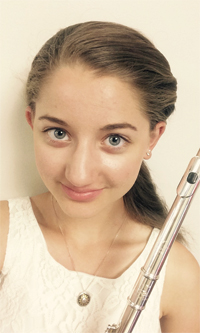 What were the first few weeks like?
What were the first few weeks like?
I really had no idea what to expect. I knew I would be balancing things like lessons and rehearsals with the academic demands of my school, which is a large research university, but there were also the complications of living in a completely new environment. During the often stressful transition of moving into college, logistical details like where to get a practice room key and basic navigation of the music building are helpful to know ahead of time. Soon after I moved in, I went to the music building to find a place to practice. Since classes did not start until a few days later, there were not many people in the building, and all of the practice rooms were either locked or taken. I walked around for an hour before I was able to find an open room. You do not want something like that to prevent you from being able to warm up properly and make you flustered during an audition.
What was your most difficult challenge?
In high school, I essentially had two main places to practice – the practice rooms in my high school and at home. Since ninety percent of the time I was at one of these two places, I could spontaneously pull out my instrument and practice almost any time of day.
College is different. Unless you happen to be in an all-music dorm with practice rooms, you are likely sharing a living space with non-musicians. The music building is a 20-minute walk across campus. Even if I want to work on, say, four difficult measures in an etude before class, it is not appropriate to play my instrument in the dorm. This means that I have to think about practice sessions like I do a class and block out chunks in the day ahead of time to go to the practice room While fragmented practice sessions worked great in high school (40 minutes during study hall, 20 after lunch, 30 before orchestra rehearsal, an hour at home, etc) that just is not possible the way my campus is laid out.
While I was in high school, I could arrive for a rehearsal half an hour early to play long tones. Now, some of my classes are scheduled directly before a lesson or ensemble rehearsal, so I have had to find ways to warm up before the academic class in order to come to the lesson prepared.
What was the most unexpected thing you experienced?
I think it is enlightening that even though I am at a large research university that is best known for its engineering and science programs, I can still perform with talented musicians who did not let choosing a career in microbiology or economics stop them from playing music. College music reminds me every day that you do not stop building your musical skills just because you did not go to Juilliard or Eastman. I am surrounded by students who have chosen music as a major, a second major, a minor, or simply audition for every ensemble they can. I spent so much time in high school choosing between academics and music, but in college both are completely compatible.
What could you have done differently in high school to be better prepared?
At the Sewanee Summer Music Festival this past summer I attended a workshop on building a career freelancing. One of the most interesting aspects was the degree to which a freelance musician must seize opportunities and make them where they do not yet exist. In high school I had a fair amount of performance experiences – church, recitals, a wedding, solo competitions, masterclasses, etc. However, I often waited until people approached me with opportunities instead of taking the initiative myself. If I had not been so intimidated by the prospect of self-promotion – for example, emailing the church music director a list of dates I was available and my appropriate repertoire before he asked, because I knew he was always looking for young musicians to play in the service – I believe I would have had access to so many more performance opportunities.
What would suggest to help other future college students?
Time management is critical in college, and even more so for a music major. One of the reasons studying music in college has a reputation for being difficult is that at a liberal arts school, ensemble participation and lessons end up only being worth one or two credits as compared to introductory level academic classes that is worth three. This is misleading because rehearsals last longer than most academic classes, and participation in ensembles and lessons requires hours of extra practice each day. You may find yourself taking fewer credits than non-musician peers but end up spending a lot more time dedicated to a lot more classes.
Samantha Tartamella
Sophomore
Bowling Green State University
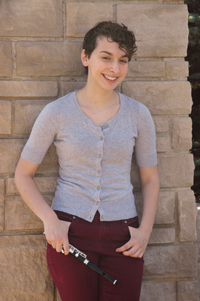 What were the first few weeks like?
What were the first few weeks like?
In two words, they were amazingly bewildering. I easily spent over half my waking existence playing flute, and no one thought it was odd. Around me were people who could say they “just couldn’t Handel that chord progression,” and promptly cause bouts of laughter. Heated debates occurred over where exactly a Bach prelude modulated. I was Alice in Wonderland being reminded daily that everyone is mad here, and all in a very similar way.
It is both inspiring and terrifying to be surrounded by so many people who love music just as much as you. In high school, you may have been the music nerd. In music school, everyone is that nerd. For the first few weeks, this mortified me. Puns are amusing, but they did not shield me from the realization that competition is stiff in the music business. I panicked and had more than a few mental breakdowns. Do yourself a favor and skip this step. Learn from your newfound friends instead of being secretly afraid of them for a few weeks. They are all just like you.
What was your most difficult challenge?
Tuning. How does it work? I am still figuring it out, but I did not even have a clue freshman year. This is generally a problem, but stick me next to a pianist and put Griffes’ Poem for Flute on my stand and there is a disaster in the making.
Of course, I tried my darndest to avoid it. I wrestled with my tuner daily, struggling to banish its demonic red light, lamenting the accursed notes that are C sharp and E natural. Unfortunately, there is only so much I was capable of accomplishing in a few weeks, especially considering my penchant for panic practicing at that point in my musical life.
Thus, disaster struck on an otherwise calm Friday afternoon. I was scheduled to play Poem in studio class for a guest flutist, in front of my professor and all of my flute-playing colleagues. I commend them for keeping straight faces during the ensuing massacre. The last thing I needed as I performed dreadfully, with nerves out the wazoo and pitch flatter than a pancake, was horrified stares.
It was a failure. I went back to my dorm, bought delicious ice cream, and cried a bit. That is all right, though, it happens. Once I recovered the shattered pieces of my psyche, I was able to learn from the experience. In fact, the next day I started us-ing drones per the guest artist’s advice, and I have not stopped us-ing them since. It has paid off, and the same colleagues who watched me crash and burn are now excitedly informing me that I have a pitch center. The performance itself was a disaster, but its repercussions continue to elevate my musicianship.
What was the most unexpected thing you experienced?
It was early on a lovely Saturday morning. The bird were chirping, the sun was shining, and a clarinetist friend was struggling to affix a pianist friend’s tie. Our chamber coach and I sat nearby, observing their futile efforts. In about fifteen minutes, we would play in our college’s annual chamber competition. Usually an impending performance would throw my nerves into high gear. Shaky hands, dry throat, shallow breathing, the whole package. Then I would get nervous because I was nervous. What use is a performance major who can’t perform, after all? Inevitably, this cycle of fretfulness and frustration would lead to silly performance errors and no fun.
Not this time, though. While giggling at the antics of my increasingly peeved chamber-mates, I was surprised to realize that I actually felt calm. Adrenaline buzzed in the back of my brain, but it inspired merely a comfortable excitement. I was ready to go, and it was thrilling. Instead of worrying what the judges would say about that one clunker of a note, I wove a story, unique though we had told it thousands of times, with my two wonderful friends. I did not expect to be shown the meaning of music and human connection by two goofs who could hardly tie a tie, but there you have it.
What could you have done differently in high school to be better prepared?
As a high school student, I revered my teachers as deities of the flute, celestial beings who gifted me with sprinklings of their immense knowledge during my short weekly visits. Their instructions were law, and surely all the exercises they gave me were divine keys to success. I played them religiously and attempted to follow their instructions to the letter, never questioning them.
While this served me well for the most part, I should have questioned. Not in a disrespectful way, of course. Your teacher, while probably not a celestial being, is an immense wealth of knowledge and should be treated with reverence. My problem in not questioning was that I never thought deeply about what my teachers were having me do, even if I understood the purpose of the exercises at face value. I still benefited from following their directions, but critically questioning and thinking would have achieved more efficient musical growth. Exercises and scales do far more good when you can easily apply them to other aspects of your playing.
What would suggest to help other future college students?
You get to college. Your days are packed. Theory class starts at 8:30 AM. Dreaded aural skills follows promptly, with a band rehearsal, lesson, and chamber rehearsal soon after. You have an hour break somewhere in the mix and decide you have to get some practice in. Technically it is lunch time, but you figure you can skip it. You will be fine, right?
No. Wrong. Go get food. You can practice later, I promise. If you do not take care of yourself, it will inhibit your playing. You must eat, no matter how inconvenient. I lost an unhealthy amount of weight in the first semester of my freshman year, simply because I did not do this. It resulted in a mysterious headache that lasted two solid months and a general feeling of sluggishness. Be healthy. It may require some meticulous scheduling, but you will be able to fit everything in, even meals.
Riley Bernardi
Freshman
DePauw University
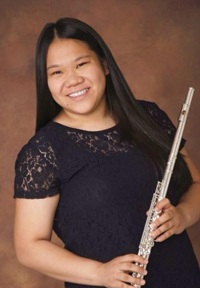 What were the first few weeks like?
What were the first few weeks like?
The first few days at DePauw were busy. We had so many meetings and activities related to orientation. There were many tests related to the School of Music and other subjects such as foreign language. The first week classes did not start until Wednesday. Saturday through Tuesday was orientation and auditions. It was frustrating trying to gain a sense of normalcy with an abnormal schedule. However, despite the strange schedule, I enjoyed the activities and lectures we attended because they gave me a preview of what to expect for the next four years and helped me meet people.
What was your most difficult challenge?
Being a new student, I have not faced many challenges yet. One challenge I found in the first few days was trying to find time to keep practicing for my auditions, which were two days after move-in day and on the same day as language (Spanish in my case) exams and orientation activities. One thing I had to do was find time later at night to practice. When I got into a practice room, the first thing I did was the harmonics exercises from The Flute Scale Book in order to warm my muscles up.
In addition, moving in is very stressful and being in a new environment with new people adds to the overall stress of starting this new chapter in your life. Therefore, when I did practice, it was hard to focus my energy and forget about all the craziness from the day. I spent a healthy amount of time on scales and harmonics in order to center my focus and energy before working on my music.
What was the most unexpected thing you experienced?
One of the most unexpected things I have experienced so far is the support and kindness of the music professors here. When I thought of auditions and music in college, I expected high-pressure, serious moments where the professor sits in front of you and listens to you play. This was not the case at all during my auditions. With all of the changes going on, I was immensely stressed and anxious go-ing into my auditions. However, when the orchestra conductor opened the door, he was kind and friendly. He welcomed me to the university and asked where I was from and how I liked the school. During my audition, the conductor asked me to stop and take some deep breaths in order to calm down. This surprised me because in many auditions I have taken, the panel sits and watches you and you just continue playing. By the end of the audition, I was a little more at ease.
After my orchestra audition, I had a band audition with a different conductor. Just as nervous as I had been for my orchestra audition, I knocked on his door and was greeted by a smiling face as he shook my hand and ushered me into his office for my audition. The first thing he had me do was tell him about my future goals and aspirations and how they related to my performance degree. Again, this was surprising, but it helped eliminate the intimidation factor of the audition. After I finished playing, instead of dismissing me from his office, the conductor asked me to sit and talk for a while. Without a doubt, the conversation we had was the best one I had had since arriving on campus. I am sure I will have many more while I am here, but this was a great moment to get to know one of the professors and feel like I had an advisor that I could go to for help.
What could you have done differently in high school to be better prepared?
To be better prepared for my freshman year, I could have studied music theory a lot more. After our theory placement tests, we received an e-mail that over half of the people in our class did not pass the theory test. Looking back, I had very limited exposure to theory. In high school, it did not line up with my schedule, and at youth orchestra, I simply could not handle more instruction time after chamber and orchestra rehearsals and with a long drive back home. I do not blame anyone for this; it was just a lack of time. In band class we covered theory occasionally, but 45 minutes is not enough time to cover repertoire and theory after warming up, taking attendance, and before packing up for the bell. I also would have taken choir, or at least voice lessons for a longer period of time to feel more comfortable with sight singing.
What would suggest to help other future college students?
Depending on the type of person you are, it is very possible that you will feel intimidated by your new surroundings and all of the new people. Do not feel like you have to meet everyone right away, or that you have to go to every event for new students. I am pretty introverted, so during the orientation days, I felt like deer in headlights and like I could not form an opinion or think about anything but just getting done with all the activities that required large groups of people. I opted to skip late-night events and used that time to do things such as organize my room, read, and decorate. This time allowed me to sort through all of my thoughts and feelings from the day.
I would definitely urge any incoming students to find time to talk to their professors. At DePauw, I found that the professors I have met are extremely nice and want me and my peers to do well. This also helps you develop relationship with those professors so when you do need help, it is not as daunting or strange to ask them for help. One thing that was stressed to me and that I found to be helpful was to think about what you want to do with your musical training. This does not mean that is what you have to do at the end of your four or five years in college, but it is a way to help you choose the appropriate classes to fulfill graduation requirements. I love performing and am pursuing a degree in performance as well as a minor in Spanish.
However, I really enjoy serving the community as well. My goal is to have a nonprofit school that serves underserved and underprivileged communities. We have to take two courses each in the fields of Social Sciences, Arts and Humanities, and Math and Science. We are also required to have a language proficiency. Knowing that I have these requirements and knowing my career goals, I have chosen courses that fulfill these requirements while also giving me a good background for what I want to do. This includes taking Spanish and education classes.
It is no secret that the world of classical music is changing. At DePauw, we have something called the 21st Century Musician Initiative. This initiative requires us to take courses in entrepreneurship and other things that give us the tools to be well-rounded musicians, meaning that we know not only how to find opportunities, but how to create opportunities for ourselves. Do not be afraid to love performing and strive to do your best, but also open yourself up to new possibilities outside of orchestral and ensemble jobs.
Cindy Chen
Senior
University of Utah
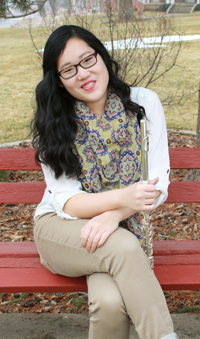 What were the first few weeks like?
What were the first few weeks like?
For me the first few days of college were definitely a little bit of sensory overload. My school always holds a club and organization event at the beginning of the year. There were so many new people, new opportunities, and new perspectives. I wanted to try a little bit of everything, but I realized I only had a certain amount of time. It took me a while to settle down into my interest groups, but once I settled into a groove it was pretty smooth sailing. Besides finding my group in music I ended up being active in my school’s honors program and student government.
What was your most difficult challenge?
My most difficult challenge (sometimes I still feel like it is my most difficult challenge) was figuring out my true passions and interests. I have often heard the phrase “fear of missing out” or FOMO thrown around in college, and I definitely had it. Everyone once in a while, I had to ask myself am I pursuing this opportunity because I really enjoy it or because I am afraid that nothing else will come along. Throughout college I think I have gotten to know myself better and feel like I have a better understanding of what I truly enjoy. The only way I found that out was to put myself out there, join clubs, ask questions, and reflect on my experiences.
What could you have done differently to be better prepared?
I jokingly say that I should have practiced more in high school, but in all honesty I think the best ways to prepare for college, even if you are going into performance, is to take the most rigorous academic and music courses your high school offers. Getting a-head in aural skills, theory, or general education requirements can only be a plus. Also, I feel like a large part of going to college, no matter what your major, is learning how to cultivate a curious mind.
What would suggest to help other future college students?
Being a college flute student has been one of the most rewarding experiences of my life thus far. Don’t be afraid to try new musical genres or to ask strangers to play in a chamber ensemble with you or to take that random French class because trying new things is what college is all about.
Cosette Bardawil
Sophomore
Lawrence University
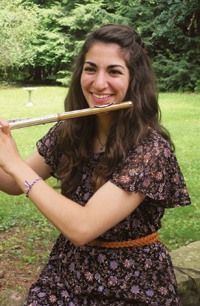 What were the first few weeks like?
What were the first few weeks like?
As a Bostonian moving to the Midwest, I never expected that Lawrence was about to feel like a second home. “Why Wisconsin? Why leave Boston?” people would ask, but I had full confidence that this was the right decision. I had chosen the school for the professors, the academic rigor, the combination of the conservatory and the college, and the warm, friendly feeling that I experienced walking around campus. During Welcome Week we participated in bonding activities and learned more about the resources, logistics, and expectations of the school.
What was your most difficult challenge?
The most difficult challenge for me (besides the weather) was time-management. In high school, I was used to having five or more classes a day, walking straight home to practice and do homework, participating in extracurricular activities, eating dinner, sleeping, and doing it all over again. In the conservatory, I came to learn that there were fewer, more intensive courses in a day with longer-term projects. Balancing these classes, the ensembles, practice sessions, and homework was not easy, but I overcame this through list-making and keeping a healthy balance between work, socializing, exercise, food, and sleep.
What was the most unexpected thing you experienced?
The most unexpected thing that I experienced was the personal attention from the professors and the ready access to tutoring. I also did not expect to make life-long friendships so soon.
What could you have done differently in high school to be better prepared?
To be better prepared for a conservatory and for college, I could have maintained a more stable practice routine in high school. I tended to switch from technique to etudes to solo pieces at random with week-long goals. In college, I find that following a practice plan with more focused, daily objectives is far more efficient and effective.
What would suggest to help other future college students?
Good luck to all future college music students! It is worth the hard work.






